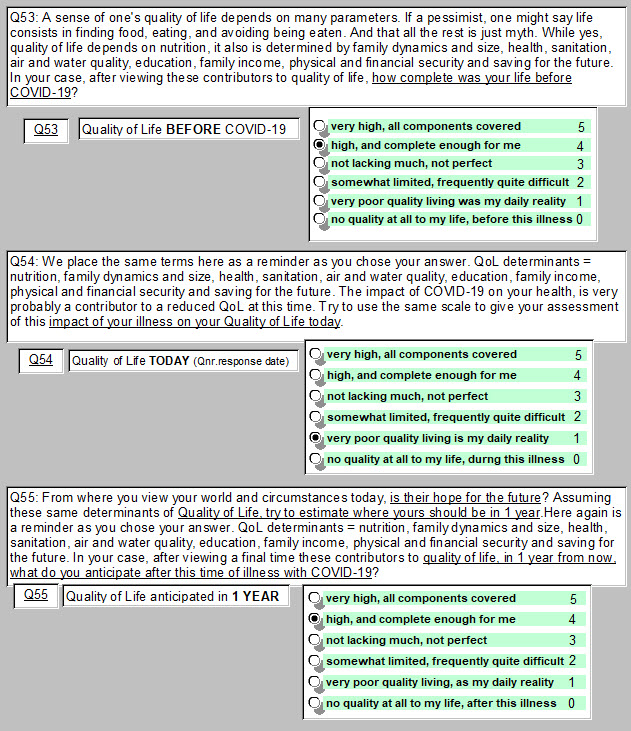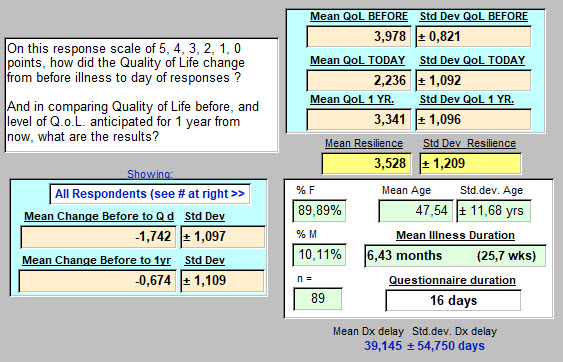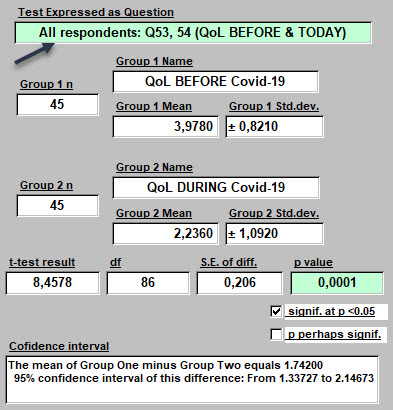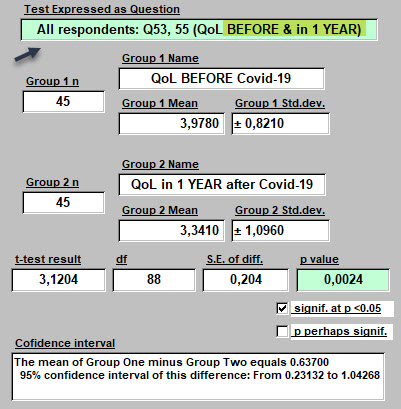Lesson 6: Impact of "Long-term" COVID-19 on Quality of Life perceptions
It makes sense that being sick doesn't feel good.
It makes sense that although many things contribute to one's Quality of Life (QoL), losing one's health may quickly make those other things seem less important contributors.
We asked about their perceptions of Quality of Life from those who identify as "Long-term" COVID-19 patients. How did they view QoL BEFORE becoming ill? How about DURING the illness as they responded to a questionnaire? And how would they project their Quality of Life at 1 YEAR into the future?
Here are the questions asked :
- The answers provided were summarized on September 28th, with 89 respondents.
- Above are also shown one person's responses.
- Response options were scored from a maximum QoL of 5, to no QoL at 0, and as shown. This permitted subsequent quantitative summary and analysis. These are referred to below as QALYs or quality points.
- It may not seem that a change from 4 to 1 QALYs is a large change. Yet it probably is. For instance: 4, QoL "high, and complete enough for me," to 1, QoL "very poor quality living, as my daily reality." That is clearly a major change in the quality aspects of that persons existence.
- Only the phrased responses, without numbers, were shown to respondents as they answered.
- Responses were obtained at a single time, and not at the three times requested through the 3 questions. (Before, During, in 1 Year). So responses for Before & I Year are based on recall of the past (6 months ago), and projection or anticipation of the future (at 1 year).
--------
And here are the results on September 28th:
We'll walk you through these responses below ...
-
-
- 89 respondents, 90% female and with an average age of 47.5 years (range: 17 to 72.3)
- Illness duration was 6.4 months on average.
- The interval from when they became ill, to when they were diagnosed with this illness (not all were), averaged 39.1 days, with a large variation as seen above.
- On this 0 to 5 Likert scale, BEFORE becoming ill, the mean value is 3.978±0.821 QALYs.
- On the day of response, DURING the illness for most, the mean is 2.236±1.092 QALYs.
- Projected 1 YR in the future, respondents answers generate a mean of 3.341±1.096 QALYs.
- On the left above, from BEFORE to DURING this illness, -1.742±1.097 QALY points lost.
- From BEFORE this illness to 1 YR in the future, a mean of -0.674±1.109 QALY points lost.
-
Analysis of Results:
Some readers may simply "eyeball" the results and move towards an interpretation.
Comparison of several of these mean values may be of use. Possibly adding confirmation to impresseion.
-
-
- These are results of Student's t-test, paired, since both responses come from the same respondent (i.e., not comparing males with females, but two answers from the same person). That is why the n value of 89 respondents became 45 as seen above when challenging these means with Student's test.
- The loss of Quality of Life from BEFORE to DURING this illness was very significant.
- With a p value = 0.0001 that suggests that there is only 1 chance in 10 000, that this hypothesis of a loss of quality in life is false. It's probably true.
- With 95% confidence, that amount of loss of quality in life due to this illness, varied from 1.3 to 2.2 QALYs for these respondents.
-
Interpretation:
-
-
- This may be a confirmation of suspicions for some, but not a surprise.
- "Long-term" COVID-19 is a major illness: lasting a very long time, and with many symptoms reported (see other article). At time of response, these respondents reported a mean of 15.4±7.8 symptoms. (And yet, they still responded! Thank you! )
- So a loss of up to 2 steps down in Quality of Life, and as confirmed statistically here, is a major loss. Seemingly undeniable.
-
But we can never get back to the past exactly as it was. And perhaps shouldn't try.
But if one liked one's Past Quality of Life, as sensed overall and combined into a single answer here,
most would assume that after this illness has passed and one has recovered, that previous QoL could also be recovered.
Is that the case? Do those with "Long-term" COVID-19 anticipate a full return to quality?
From the result presented at the top of this page, it may not be so.
We are not trying to predict the future here.
We are simply presenting how these respondents feel today, about possibilities.
Here is the Analysis of those Results: BEFORE compared with in 1 YR
These are of course, the same 89 respondents.
-
-
- Comparing means for Quality of Life BEFORE, and in 1 YEAR, respondents anticipate losing a mean of -0.674±1.109 QALYs.
- With 95% confidence, that ranges from 0.23 to 1.04 QALYs.
- How certain is that? That the anticipated future, will have less Quality of Life, than did life lived before COVID-19?
- The p value is 0.0024. Statisticians would say the difference in these mean values is significant because it's below 0.05. Another way of saying it is that there are only 24 chances out of 10 000, (ten thousand) that this apparent difference is not real, not present.
- Again, we are not predicting the future here, or trying to. We are trying to add clarity to better understand the future anticipated today, by respondents. This answer obtained at a mean of 25.7 weeks into this illness.
-
Interpretation:
-
-
- Clearly, less Quality of Life is anticipated for the future, when compared with known QoL in the past.
- While some answered that there would be no change in past and future life quality. 7 responded a level 5 QALY Before and in 1 YR. And 21 responded a level 4 QALY Before and in 1 YR. No one suggested life would be improved by this illness.
-
COMMENT
And yet, some would suggest that for some, things may be better than they were. Not worse.
- Other comparisons could be made and will be in subsequent articles: gender differences in perceiving Quality of Life, for example. Enough has been presented here to think about.
- How does one anticipate a cheerier future? One hopes for it. And how we hope, if done successfully, is not just done willy-nilly. There can be a method. Often unconscious perhaps. At times, intentionally pursued and learned. At times, supported by someone else.
- So can we translate the above result (and it seems pretty certain) into some degree of hopelessness for the average respondent to these three questions?
- If so, that may be a place to start now, today, to make inroads into helping to boost hopefullness. Yes, even while still feeling crummy.
- There are experts in this pursuit. I am not one. Not because I am not hopeful personally for the future Quality of my Life and that of others. I am.
- But there is a path to follow on that walk from hopelessness to filled with hope. And sometimes, taking a beating in life, may ultimately lead to being even more filled with hope than we were before the hard times arrived. Sounds a bit like Post Traumatic Stress Disorder (PTSD).
Heading in that positive direction, might just start here. With a review of some experts in this.
-----------
This was Lesson 6.
Here are those that came before, also grown from the seeds of these terrific responses, if you missed them: (those that are indented, are more recent, and therefore have more data. But don't miss what came before! ).
Lesson 1: Test results - how uncertainty changes our lives
Lesson 1a: Test results - adding light as well as heat. A concise reporting of test results. (at 77 respondents on that date).
Lesson 2: So what about that weight gain?
Lesson 2a: More responses = more insights on WEIGHT
Lesson 3: Effective emotional support - where shall we turn?
Lesson 4: "Long-term" COVID-19 - How scary is that?
Lesson 5: Fostering Resilience
<<<<<<<<< Introduction to the Questionnaire
Direct link to the questionnaire >>>>>>>>>
A découvrir aussi
- Lesson 2: So what about that weight gain?
- Lesson 3: Effective emotional support - where shall we turn?
- Lesson 7: It's Physical. It's Emotional. It's Both.




